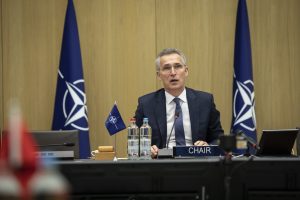NATO, the transatlantic alliance binding together the United States, Canada, and 28 European countries – including France, Germany, and the United Kingdom – is turning its focus to China in a bid to adapt to changing global realities.
That’s one of the major recommendations of a new report from experts tapped by the NATO secretary general, titled “NATO 2030: United for a New Era.” The report has a dedicated section on China, which opens with a stark warning: “The scale of Chinese power and global reach poses acute challenges to open and democratic societies, particularly because of that country’s trajectory to greater authoritarianism and an expansion of its territorial ambitions.” It classifies China as a “full-spectrum systemic rival,” and notably cautions against viewing China as “a purely economic player or an only Asia-focused security actor.” Indeed, the report notes that NATO members are directly feeling the impact of China’s rise, with cyberattacks traced to Chinese actors targeting NATO states, Chinese infrastructure being built in NATO members, and China’s direct military reach expanding “into the Atlantic, Mediterranean, and Arctic” – NATO’s traditional areas of focus.
“Looking out to 2030, NATO must provide a position of security and strength to contribute to Allies’ relations with China and guard against any attempts by Beijing to employ coercion against them,” the report concluded. “This requires that China be unable to exploit differences between Allies.”
Among its key recommendations for achieving that goal: “NATO must devote much more time, political resources and action to the security challenges posed by China,” including creating a consultative body specifically to discuss China.
That’s a stark difference from the last strategic planning report NATO issued a decade ago, which The New York Times noted did not mention China at all.
Calls for NATO to implement a united response to the China challenge have been gaining steam in the past few years. NATO Secretary General Jens Stoltenberg has spoken out previously about the rise of China and its implications for the alliance. The United States is pressing hard to get its partners and allies around the world on side in its strategic competition with China, including launching the U.S.-EU dialogue on China in October 2020. The incoming Biden administration has pledged to do even more to partner with allies on the China challenge.
In another step in that direction, on December 2, the foreign ministers of the NATO members, along with delegations from Australia, Japan, New Zealand, and South Korea, gathered virtually to discuss the rise of China and the implications for the global balance of power. Ahead of the meeting, the U.S. Mission to NATO made its stance clear, tweeting that China’s “infrastructure grab & use of predatory lending has global implications, including in #Europe.”
During the NATO foreign ministers meetings, “Secretary Pompeo emphasized the threat the Chinese Communist Party (CCP) poses to Allied security interests and encouraged increased cooperation to safeguard against the CCP’s malign activities,” Cale Brown, principal deputy spokesperson at the U.S. State Department, said in a statement.
In a press conference ahead of the meeting with Asia-Pacific partners, Stoltenberg said that “China is not our adversary,” noting that “[i]ts rise presents an important opportunity for our economies and trade.” But, he added, “There are also important challenges to our security. China is investing massively in new weapons. It is coming closer to us, from the Arctic to Africa, and by investing in our infrastructure.”
Stoltenberg also pointed out that “China does not share our values. It does not respect fundamental human rights and tries to intimidate other countries.” He concluded, “We must address this together, both as NATO Allies, and as a community of like-minded countries.”
After the meeting, Stoltenberg said the ministers had discussed the report’s assessment of “China’s military development, its growing activity in our neighborhood, and the implications for NATO resilience.” He added that the meeting “also discussed what more NATO can do with our partners. Such as sharing information and insights; promoting common approaches, including in cyberspace; and strengthening global rules and norms, for instance on arms control.”
“Over the past year, we have seen a significant shift in our understanding of China,” the NATO secretary general continued. “And an increasing convergence of views, both within NATO, and with our partners.”
However, forging a truly unified NATO response to China’s rise will be difficult. Attitudes and approaches toward China vary wildly within the grouping, from the United States’ forward-lean into competition to more pro-China governments in Turkey and Hungary. Many other NATO members, including Italy, Greece, Portugal, and Spain, tend to prioritize the benefits of trade and economic relations with China over the potential security risks.
When asked about the new NATO report, Chinese Foreign Ministry spokesperson Hua Chunying rebutted the idea that China posed a threat to the transatlantic alliance. “China has never practiced anything like ‘coercive diplomacy’ or ‘intimidating diplomacy,’” Hua told reporters at the daily press briefing on December 1. “As for ‘threats’ or ‘challenges’, can anyone give us an example of any security threat posed by China to other countries? China has always been a builder of world peace and defender of the international order.”
“We hope NATO will uphold a correct view on China, look at China’s development and domestic and foreign policies in a rational manner, and do more things that are conducive to international and regional security and stability,” Hua concluded. “China stands ready to conduct dialogue and cooperation with NATO on the basis of equality and mutual respect.”

































